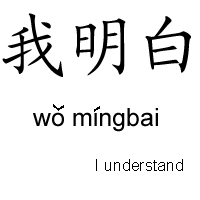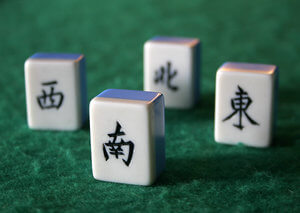 After a sudden burst of learning Chinese on an intensive course, I became caught up in work and barely practiced for a month. Inevitably, starting one-to-one lessons with the same tutor was an exercise in embarrassment as I’d nearly forgotten everything she’d taught me that wasn’t related to ordering in restaurants.
After a sudden burst of learning Chinese on an intensive course, I became caught up in work and barely practiced for a month. Inevitably, starting one-to-one lessons with the same tutor was an exercise in embarrassment as I’d nearly forgotten everything she’d taught me that wasn’t related to ordering in restaurants.
I guess everyone has a hook to learn a language, something they’re particularly interested in, and mine is definitely food and cooking. Coming back to the course after a month I could easily say “I’ve got a reservation at 8 o’clock, for 4 people”, “Could you wait five minutes” and “I’ll have this please…spicy but with no celery”. At the same time, I could barely remember how to ask someone about their job.
Of course, this may also give the impression that I spend too much time in restaurants and rarely want to chat about work.
The intensive course worked well as a rote learning process, but left me with more questions than answers. For better or worse, I tended to keep these to myself, rather than waste everyone else’s time with questions from my somewhat abstract thought processes. Taking one-to-one lessons gives complete freedom to stray wildly from the planned syllabus and schedule, letting me relate everything to other items that I know. In addition, a single teacher knows exactly how much I (should) already know and can progress accordingly – something that I didn’t feel was working when taking classes with five different tutors.
At the same time, using the proper syllabus I seem to have reached a tipping point of vocabulary, after which so many other words and phrases make sense. As I mentioned previously, low-level Chinese is somewhat akin to Pidgin English. Whereas we may have a name for something, Chinese frequently uses combinations of other words to imply that thing. For example, “web surfing” in Mandarin is “shàng wǎng” or “on net(work)”. If you also know that that qiú is ball it becomes a little clearer that wǎng qiú is “net ball”, which means tennis. I’m undoubtedly massively oversimplifying, but at my level it feels like quite a satisfying breakthrough.

West, South, North, East...I think
Further to this, learning directions and landscape features suddenly clarifies so many place names that I’ve unwittingly used every day. North, south, east and west are Běi, nán, dōng, xi. Jīng is capital, so Beijing is northern capital; Nanjing is southern capital etc. – again, somewhat obvious once you know, but still pleasing. I’ve now assigned vague meanings to bridges and districts that are probably utterly wrong.
Combine this with learning the very simple grammar and sentence structure and we can now have long and rambling conversations about a wide variety of topics and activities. It’s got to the point that one of the hardest parts of learning Mandarin is coming up with plausible stories to use new vocabulary. I’ve alarmed the teacher a few times with made-up stories starting “I felt she needed to go to the hospital at 2am…”, “I bought a cat last week – it was a bargain so I got a spare” or “I am an only child, but I have a younger brother and an older sister. One is a Russian doctor and one is a Spanish nurse. Because they both dislike beef noodles, we don’t talk on the phone very often”.
We’ve also gone out for live practices, visiting shops, markets, bars and of course, restaurants. This involves pitting my language skills against the patience of some underpaid staff during their quieter times. This tends to go well enough, but I do wish they’d accept tips to compensate them for the pain I’m inflicting on their ears. It’s best to get out of Sanlitun for these practices, or else the staff frequently answers in decent English, and we have the awkward moment where I persevere in Mandarin and they look at my teacher quizzically, wondering if their English is equally unintelligible.
So far we’ve been learning exclusively in Pinyin. The teacher seems to be keen to move onto characters, which look tricky, so after a brief rush of success I’ll soon feel like an idiot again.
Apparently, I should get some character flashcards, so any recommendations would be appreciated.







We’ve just started on the characters. And, like the spoken stuff, they feel initially like you’ll never conquer them, and then they break down into sensible parts.
Though I have a feeling they’ll become more complicated again the further we get in. One-to-one is definitely the way to go, though. And congrats on being comprehensible. My Chinese confidence took a real dive after hitting some very thick Northern accents outside Songpan, but it’s now back to normal in the city.
I’m definitely learning with a thick Beijing accent, but it’s necessary here. Taxi drivers simply don’t understand Sanlitun, I have to go full pirate and say Sanlituar, fanguar( for fanguan) etc. – understanding a mix of accents was the only real benefit of having 5 tutors at one time.
It’s unhelpful, but comforting when you get out to Xinjiang and Gansu to find that even native Mandarin speakers struggle to understand each other.
加油!Sounds like you’re doing great! And the characters are a challenge, for sure, but I absolutely LOVE it when I can read signs and menus and things (which I can’t always, completely, but working on it!) Literacy is a wonderful thing. Lots of the characters start out pretty easy, too, like shang wang that you mentioned above, that’s just
上网.
Simple, right? Anyway, physical flashcards are a pain, I use Skritter. It’s a paid service but for me? Totally worth it. Here’s my referral link if you want to get two free weeks on it: http://www.skritter.com/refer/wallaby78erik
Looking forward to hearing about your progress!
Thanks for the encouragement – I will get around to Skritter at some point!
Go to those Xinhua bookstores and buy flashcards for kids. Bought myself a Vegetable and Fruits flashcard set, was quite useful: photo in front, pinyin, character and English translation at the back 🙂
Sounds ideal – anything food related seems to work
Taking the plunge from pinyin to characters is scary, but really it is absolutely essential. Aside from texting or writing on the computer learning pinyin is practically worthless as pretty much everything is written in characters.
I’ve heard good things about skritter too, but I’m cheap so I don’t want to pay for it. I try to keep it old school and practice my characters with a good ‘ole pen and paper. (Although, truth be told, I usually practice writing while watching a TV show. The rote memorization gets too boring for me otherwise.)
Good luck!
Thanks! It’s going to be a pain, but should be worthwhile
Useful article. I find accents are a problem – my Chinese teacher was from Wuhan, and Guangzhou residents found my accent hard to understand 🙁
I sort of understand your struggle as I underwent some linguistic pain myself recently, after two summers studying mandarin in Beijing. I’d suggest my school, which is CNU Beijing, as I think it’s got very good teachers with decent classrooms (computers, projection screens, clean area, tinned drinks machines)…), excellent methods and quite affordable, specially compared to the whoopingly expensive SanLiTun area where tourists are ripped off on a daily basis with no regret whatsoever, I’s also got a dormroom just in case you want to be just 5 minutes again from the classroom, and your other daily activities allow for this, though is was not as satisfactory as the classrooms due to somewhat poor management policies and too many noise teenagers playing football on the corridors. Still, a good place. There they teach in english, pinyin (please, don’t say: “pidgin”) and chinese characters, all at the same time, but not messed.
I wish you luck: chinese learning is all about memory, but after you memorize the first hundred characters, the rest will look easier, as some of them just add meaning on top of one another in a bootstraping fashion. Please keep us posted, as I enjoy your writing style a lot.
Thanks for the tip about CNU.
Pidgin is different to Pinyin – it’s a heavily simplified form of English where complicated words and expressions are broken down into simpler parts. For example instead of learning a new word of limited use such as tennis you would express the same concept by saying ‘bat and ball game’. I found this quite similar to Mandarin expressing tennis as wǎng qiú/’net ball’, although I’m sure the analogy will collapse once I get a bit more advanced.
Oh! thank you for new insight 🙂
Pingback: Lijiang, the Venice of the East
Pingback: A slice of rural life in Sichuan Province - Dazu | YNFAH